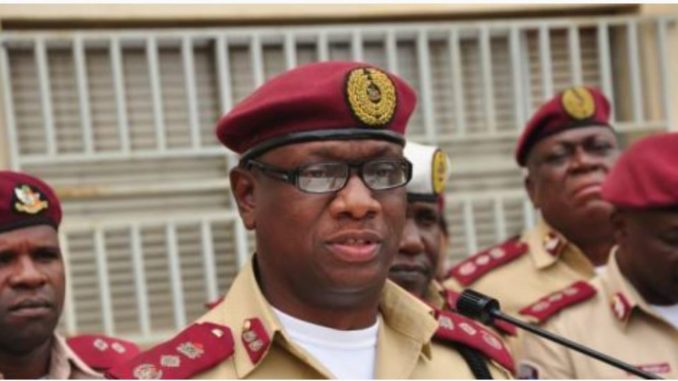
DANGER is perpetually lurking on Nigeria’s notorious highways. During the commemoration of the 2018 World Day of Remembrance for Road Traffic Victims on Monday, the Federal Road Safety Commission stated that 1,054 people died in the past 33 months on Lagos-Ogun routes. Notable was the October incident on the Lagos-Ibadan Expressway, where 10 people lost their lives when a luxury bus ran into a stationary truck, which officials attributed to excessive speeding. The losses from road traffic crashes have remained alarming over time because of dilapidated roads, recklessness and scant enforcement of regulations.
The scary situation is given full expression in the official numbers from government agencies, though not all cases are reported. In a bloody incident on Monday, four people died in a multiple crash on the Ushafa-Bwari Road in Abuja, which FRSC officials ascribed to dangerous driving. Similarly, 1,331 people lost their lives to road traffic crashes across the country in the second quarter of 2018, figures from the National Bureau of Statistics show.
Indeed, the NBS says that two people die every four hours from RTCs; every year, 20,000 of the 11.65 million vehicles on our roads are involved in crashes, resulting in injuries and fatalities. With 289, 238, 149, 128, 126, 115 and 114 RTCs, the Federal Capital Territory, Kaduna, Ogun, Nasarawa, Niger, Kano and Ondo states were the worst places respectively to drive a vehicle in Nigeria in Q2. This is a disturbing trend; the impact on the victims and their families is devastating.
In all, the NBS stated that 28,195 travellers died in RTCs in the five years to September 2018. Major incidents are recorded daily due to a variety of factors, some of them avoidable. In Lagos, Nigeria’s commercial hub, 30 people died in Q2 2018 with 241 injured. In a horrific incident at Otedola Bridge on Lagos-Ibadan Expressway last June, 12 people were burnt to death when a petrol tanker fell and exploded. Fifty-four vehicles were incinerated in the fire that ensued.
However, the decrepit road infrastructure is a major issue in this unending disaster. Unlatched containers, fuel tankers and trailers overturn on these deplorable routes. Irritably, the highways that support business activities in Apapa (Nigeria’s premier seaports are situated there), the Lagos-Badagry, East-West Road, Ilorin-Kaduna and Benin-Lokoja-Abuja, among others, are in a shambles.
Apart from this, the poor state of the vehicles plying the highways contributes significantly to crashes. Tyres of articulated vehicles are worn out; the vehicles are smoky and lack modern facilities for navigation. Despite a slew of regulatory agencies like the Standards Organisation of Nigeria, Customs and state traffic agencies, the FRSC stated that 3,000 crashes were caused by imported fake tyres in a period of five years. This dereliction is dangerous.
In many of these tragedies, the FRSC cites speeding, the use of cellphones behind the wheels, drink-driving and other violations as being responsible. “Most of the accidents are caused by an attitudinal disposition…,” the FRSC says. It is high time the FRSC addressed these challenges.
To make amends, the European Union, in a 2016 study, recommended the implementation of measures against risky behaviour such as speeding and drink-driving. The report admonished governments in the EU to provide “smooth infrastructure” for road users. In Nigeria, the FRSC, the main agency tasked with safety on the highways, has to redouble its capacity to enforce the rules. It is a conjecture if the speed limiter device, which the FRSC introduced, has checked the recklessness of commercial and truck drivers. It should review the policy, which is achieving a profound effect in countries like Australia and Singapore. The National Assembly, which has been evasive on speed-limiters, should legislate on it and add new provisions to reduce RTCs in the country.
Additionally, the FRSC should clamp down on drink-driving by using breathalysers. Hugo Lloris, who captained France to the FIFA World Cup football title in Russia, was fined £50,000 and banned from driving for 20 months in England after being tested for alcohol use last September. Alcoholic beverages should therefore, be banned at bus stations; a campaign against drink-driving, especially among commercial drivers and the youth, is not out of place.
The enforcement of seat belt wearing culture should be scaled up. According to the World Health Organisation, 105 countries, including Nigeria, have a mandatory regulation for the wearing of seat belts in vehicles. That it is not mandatory for the back seat occupants in a vehicle here is a minus. That should change. Every state government and the FRSC should build capacity to respond to emergencies by acquiring speed cameras, modern towing vehicles and fire prevention equipment.
As it is, the revamp is incomplete without government action. Government at the federal and state levels need to do better by reconstructing the roads. In the 2018 Appropriation Act, the Federal Ministry of Power, Works and Housing received a vote of N682.9 billion, but Nigeria needs an annual investment of N4.5 trillion for the next 15 years, as per a 2018 study by Lagos-based Financial Derivatives Company, to rebuild its rundown infrastructure. In contrast, China reportedly spent an estimated 15 per cent of its GDP per year on infrastructure between 1980 and 2005. Therefore, by reducing the recurrent to capital ratio of budget, cutting down on corruption and privatising public enterprises, government would have more funds for infrastructure.
The Federal Government should provide the funds for the Commission to acquire modern equipment for effective road safety management.
END

Be the first to comment